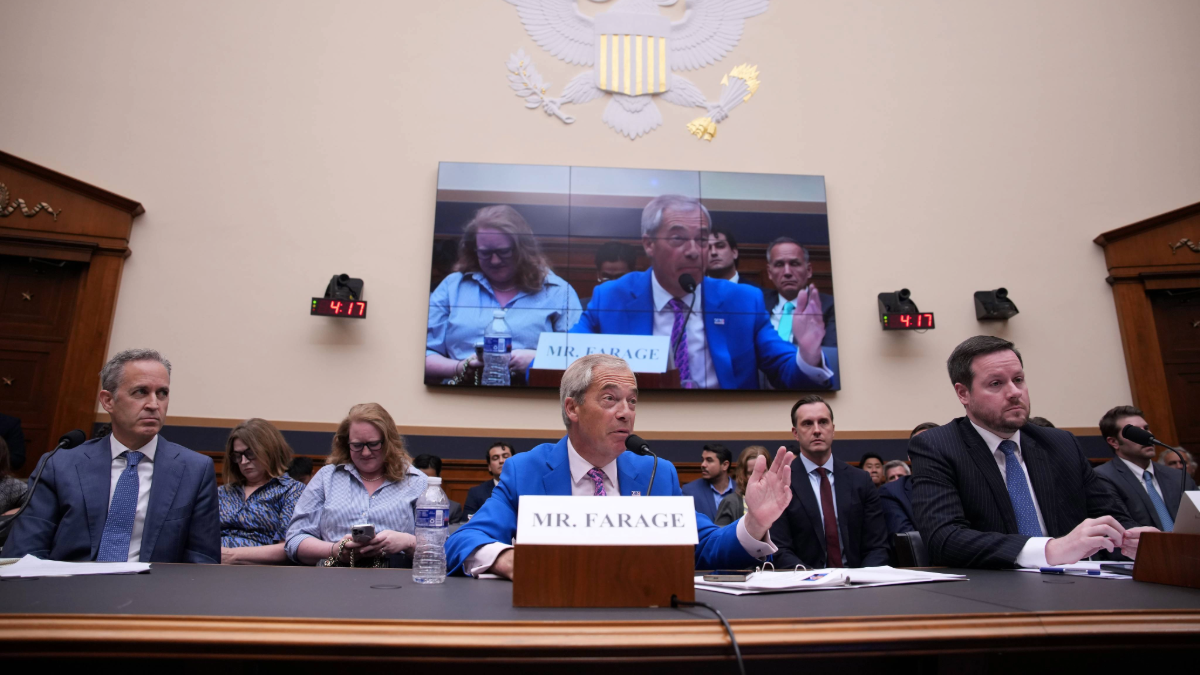Washington and Brussels Vie for Control Over Big Tech
Mark Scott / Sep 8, 2025Mark Scott is a contributing editor at Tech Policy Press.

WASHINGTON, DC—SEPTEMBER 3, 2025: Reform UK Leader Nigel Farage testifies before the House Judiciary Committee in the Rayburn House Office Building on September 3, 2025 in Washington, DC. The committee held a hearing titled "European threats to American free speech and innovation." (Photo by Kevin Dietsch/Getty Images)
When US lawmakers gathered in Washington last Wednesday for a hearing about European online safety rules, you could be forgiven for thinking the almost 5-hour hearing would focus on the policy complexities of the European Union’s Digital Services Act and the United Kingdom’s Online Safety Act.
Instead, the House of Representatives’ Judiciary Committee hearing became a physical representation of how the culture wars, which began in the United States, but have subsequently spread across most democratic countries, have engulfed global attempts at policing the digital world.
Rep. Jim Jordan (R-OH), the Republican chairman of the House Judiciary Committee, laid out the case for the prosecution.
“Laws like the Digital Services Act (DSA) and the Online Safety Act (OSA) are the engines of a global censorship regime targeting political speech disfavored by European bureaucrats,” Jordan told the hearing.
His Democratic party opponents, led by ranking member Rep. Jamie Raskin (D-MD), framed the testimony — including from populist British politician and devoted Trump supporter Nigel Farage — to criticize the White House and Congressional Republicans for targeting long-standing European allies and their growing stable of digital regulation.
“We could have a meaningful hearing on this complicated subject,” Raskin said, “but this hearing's just the drive-by hit against a strong democratic ally to benefit a Donald Trump sycophant and wannabe.”
On digital policymaking, the Congressional hearing contained little, if any, substance.
But on the geopolitics of which country should regulate some of America’s largest companies, the scene in Washington represented the latest chapter in a growing stand-off between the US and Europe that has the potential to lead to another transatlantic trade war.
It also was a ratcheting up of political pressure from those in Congress that had previously targeted the Biden administration and American researchers for their purported role in domestic content moderation decisions — including those around the COVID-19 pandemic and 2020 US presidential election.
At the heart of this battle is a decades-old mismatch between US industrial power and EU regulatory might. That is now framed within an increasingly digital economy where global platforms like those of Meta and Alphabet have taken on the role of quasi nation states.
The US remains the overwhelming global champion when it comes to tech. Europe’s tech sector, while growing, is a laggard compared to its American and Chinese counterparts, based on overall investments, companies’ market valuations and the dominance of online markets from California to Cambodia.
Yet on digital rulemaking, the 27-country bloc — alongside the UK, the smaller post-Brexit regional power on the other side of the English Channel — is the de facto Western rule-setter on everything from data protection to digital competition to platform governance.
Tech firms have progressively embraced rules like the EU’s General Data Protection Regulation and Digital Markets Act as global standards, in part to set one internal regulatory approach on which they can run their global empires.
That friction lies at the heart of the frosty relationship between Washington and Brussels. It is compounded by the Trump administration’s skeptical stance toward generational European allies as part of a MAGA agenda attempting to rewrite the post World War II geopolitical rulebook.
The White House and its allies in Congress have hit out against Europe’s drive toward online safety and online competition.
Some American politicians accuse EU and UK officials of passing sweeping censorship regimes that infringe on US citizens’ First Amendment rights. They also contend Europe’s digital antitrust rules, which remain a primary bugbear for Silicon Valley’s biggest names, unfairly hamstring US tech firms in favor of smaller European rivals.
EU policymakers reject those accusations.
They maintain the Digital Markets Act benefits both European and international companies by allowing them to fairly compete with global tech titans. The Digital Services Act, according to its advocates, empowers social media users to take greater control of their online experiences. It also requires greater transparency from tech companies about how they serve up billions of posts to users each day.
“The DSA creates no new rules about what can be said online, nor can it, legally, be considered to legitimize any form of censorship,” according to a letter sent to Jordan by a group of European academics ahead of the September 3 hearing.
What’s unclear is which side will blink first in this transatlantic game of chicken.
Trump has already threatened retaliatory tariffs against countries that implement digital regulation and taxes against American firms. The European Commission, or the EU’s executive branch, has said it won’t budge on its digital rules, though postponed an antitrust fine against Google out of fear of its impact on EU-US trading relations. Brussels eventually announced the almost €3 billion fine on Sept 5.
“We must act in accordance with the rule of law, a core European and democratic value, protecting rights of defense, guaranteeing predictability and transparency in the application of our rules,” Teresa Ribera, Europe’s competition chief, said when announcing the Google fine.
An upcoming DSA announcement, related to X’s alleged infringement of those online safety standards, will test both Brussels and Washington’s eagerness to pick a fight on digital regulation.
Alongside such transatlantic posturing, the further politicization of Europe’s online content rules from Congress almost certainly lies ahead — despite the Judiciary committee hearing’s failure to substantively unpick how the DSA and OSA navigate protecting online users from illegal content and upholding people’s free speech rights.
Jordan and other US lawmakers traveled to Europe in August, and met with officials and regulators in Brussels, London and Dublin, respectively, about these online safety rules. His verdict: “The biggest takeaway from our week here in Europe is that nothing has really changed our concerns.”
Campaigners also published accusations on Sept 3 that suggested the French government actively tried to censor people on Twitter. Those unsubstantiated allegations mirrored similar claims in the so-called “Twitter Files,” the select publication of internal Twitter documents authorized by Elon Musk, which purported to show the federal government’s coercion of the social media company’s handling of content moderation issues.
Such claims and counter-claims about whether the EU’s DSA and UK’s OSA are vehicles to censor people online will only grow louder as regulators in Brussels, London and other EU member countries’ capitals implement what are, on paper, requirements for US tech firms to be transparent and accountable for how they handle social media posts which may infringe these companies’ terms of service.
Those regulatory efforts mirror similar attempts from the US Federal Trade Commission.
Such policy detail, however, will likely get lost in the culture wars now swirling around Europe’s online safety rules.
This digital regulation is still in its infancy, and its impact on people’s fundamental rights — to both protect free speech and ward against illegal online content like terrorist propaganda — is untested.
Unfortunately, that nuance is getting drowned out by the increasingly hostile relationship between the US and Europe.
Authors
